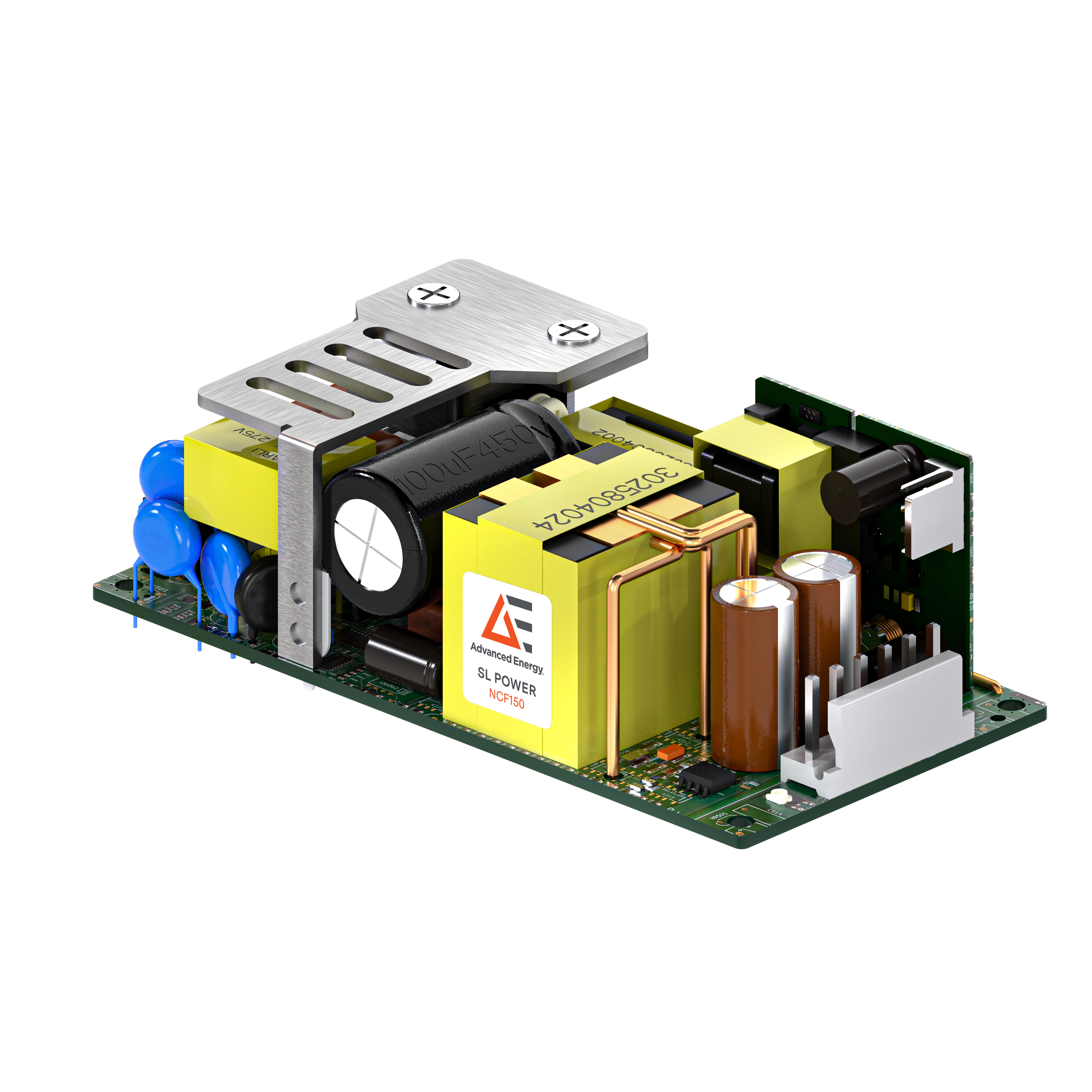The Importance of Choosing the Right Power Solutions for CF Rated Medical Devices
投稿 9月 10, 2025 によって Paul Kingsepp
Blog Summary
• Growing Demand for Safe Medical Power Solutions: As people live longer and more late-onset conditions are diagnosed, there's an increasing need for medical equipment, especially for cancer and cardiovascular treatments, that meets stringent safety standards like IEC60601-1, particularly Type CF for cardiac applications.
• Challenges in Designing Type CF-Compliant Power Supplies: Meeting the ultra-low leakage current requirement (<10 µA) and high isolation standards involves complex design considerations, including managing capacitive coupling and EMI. Non-compliance during testing can lead to costly delays.
• Advanced Energy’s NCF Series Simplifies Compliance: The NCF family (150–660 W) offers off-the-shelf, CF-rated power supplies with compact designs, high efficiency, and built-in protections. These units streamline development for cardiac-connected devices by reducing system complexity and ensuring compliance with CF safety standards.
• Growing Demand for Safe Medical Power Solutions: As people live longer and more late-onset conditions are diagnosed, there's an increasing need for medical equipment, especially for cancer and cardiovascular treatments, that meets stringent safety standards like IEC60601-1, particularly Type CF for cardiac applications.
• Challenges in Designing Type CF-Compliant Power Supplies: Meeting the ultra-low leakage current requirement (<10 µA) and high isolation standards involves complex design considerations, including managing capacitive coupling and EMI. Non-compliance during testing can lead to costly delays.
• Advanced Energy’s NCF Series Simplifies Compliance: The NCF family (150–660 W) offers off-the-shelf, CF-rated power supplies with compact designs, high efficiency, and built-in protections. These units streamline development for cardiac-connected devices by reducing system complexity and ensuring compliance with CF safety standards.
As healthcare and medicine improves, people are living longer, with more late onset conditions being detected and diagnosed. This has led to an increased need for equipment to treat cancer and cardiovascular issues.
In any application where the equipment touches a patient (or operator), safety is paramount. In applications where the equipment is used close to, or in direct contact with, the patient’s heart, the safety requirements are even more stringent.
Designers generally rely on the front-end power supply (PSU) to ensure only safe voltages are present. Achieving this means complying with the requirements of standards such as IEC60601-1, particularly with regard to isolation and leakage currents.
For general medical applications it is acceptable to provide adequate isolation from the mains voltage (and in some cases earth) and ensure that the leakage current is below 100 µA. However, for cardiac and blood-stream applications the Type CF (Cardiac Floating) clause is applied.
This is the highest level of protection, and is implemented in equipment such as heart monitors, catheters and defibrillator ECG, where the isolation requires multiple layers of protection. Any applied parts must be well insulated and ‘floating’ with respect to earth. The leakage current requirement is extremely tough to meet: 10 µA or less.
When designing to meet the isolation and leakage current needs to comply with IEC60601-1 CF requirements, developers must focus on any capacitive coupling across power transformers and through ‘Y’-class filter capacitors (that are usually grounded to ensure EMC requirements are met). To meet the sub-10 µA leakage current means attention on the ‘Y’ capacitors, filtering of the PFC stage, main power transformer and output filtering.
Even when armed with the requisite knowledge and design skill, meeting the requirements of IEC60601-1 at the Type CF level has risk of non-compliance during the extensive testing – particularly in the areas of EMI and leakage current. Any failure requires design tweaks and re-submission, which add significant cost and can delay a project by weeks or months.
.png) Fig 1: The NCF150 was the first off-the-shelf CF-rated power solution, and the NCF series now covers CF-devices from 150 and 660 W.
Fig 1: The NCF150 was the first off-the-shelf CF-rated power solution, and the NCF series now covers CF-devices from 150 and 660 W.
Designers of cardiac-connected medical equipment have traditionally had few (if any) alternatives other than to design the PSU from scratch. However, in September 2024, Advanced Energy announced the groundbreaking release of its first off-the-shelf CF-rated power solution. This was then followed by three more NCF series devices to give a range of options covering power levels between 150 and 660 W.
The NCF family is designed to:
1. Simplify integration of the power supply into the end device.
2. Reduce system size and weight.
3. Reduce system level component count.
4. Provide Type CF functionality normally provided at the system level, reducing time and complexity in the development process.
There is a high degree of commonality in the specifications for the four series of CF-rated PSUs (NCF150, NCF250, NCF425, NCF660).
1. All units provide CF levels of leakage current (<10 µA) and isolation (2 MOPP), 5 kV defibrillator pulse protection, as well as overload, short circuit, over voltage and over temperature protection.
2. All units are housed in a compact, open-frame chassis that benefits from external airflow where available. \
3. Each series operates from a universal (85 to 264 VAC) Class I mains input with a single output rail of either 12 V, 24 V or 48 V. Other output voltages may be possible.
4. All models come with high efficiency at > 90%.
The NCF family is designed to:
1. Simplify integration of the power supply into the end device.
2. Reduce system size and weight.
3. Reduce system level component count.
4. Provide Type CF functionality normally provided at the system level, reducing time and complexity in the development process.
There is a high degree of commonality in the specifications for the four series of CF-rated PSUs (NCF150, NCF250, NCF425, NCF660).
1. All units provide CF levels of leakage current (<10 µA) and isolation (2 MOPP), 5 kV defibrillator pulse protection, as well as overload, short circuit, over voltage and over temperature protection.
2. All units are housed in a compact, open-frame chassis that benefits from external airflow where available. \
3. Each series operates from a universal (85 to 264 VAC) Class I mains input with a single output rail of either 12 V, 24 V or 48 V. Other output voltages may be possible.
4. All models come with high efficiency at > 90%.
The NCF150 operates at full power (120 W convection cooled, 150 W with 200 LFM of forced air) at temperatures between -20°C and 50°C and is capable of operating at up to 70°C with derating. The compact chassis measures just 4.0” x 2.0” x 1.26”.
The NCF250 delivers up to 175 W convection cooled and up to 250 W with 400LFM of air. It is housed in a 5.0” x 2.4” x 1.6” chassis.
The NCF425 is slightly larger than the NCF250 at 6.0” x 3.5” x 1.5”, yet it is able to deliver substantially higher power at 425 W with airflow and 270 W with convection cooling.
The most powerful CF-rated PSU is the NCF660, which measures just 7.0” x 4.0” x 1.6” and delivers 660 W with airflow and 440 W convection cooled.
All NCF family PSUs are designed with reliability in mind. All specified electrolytic capacitors will exceed seven years life based upon continuous usage at an ambient temperature of 25°C. All units come with a full three-year warranty.
The PSUs are suited for any application where contact with the patient’s heart or bloodstream are a possibility. This includes surgical generators, RF ablation, pulsed field ablation (PFA), cardiac assist devices, cardiac monitors and cardiac mapping systems.
While the NCF PSUs only provide a single rail, this can be easily adapted by designers using devices from Advanced Energy’s range of non-isolated point-of-load (NiPOL) converters. This allows for multi-rail power schemes to be rapidly developed with no issues related to the safety approvals provided by the NCF unit.
For further information (including datasheets), please visit the NCF Series product page.
Paul Kingsepp
Advanced Energy
As Advanced Energy’s Product Line Manager for open-frame products, Paul Kingsepp develops product strategy for the company’s broad range of AC-DC power supplies. Paul collaborates closely with engineers, designers, and market analysts to identify market trends, anticipate customer requirements, and drive product development initiatives from conception to launch. His ability to balance technical innovation with market demand has resulted in a portfolio of products that exceed customer expectations.
その他の投稿 Paul Kingsepp

